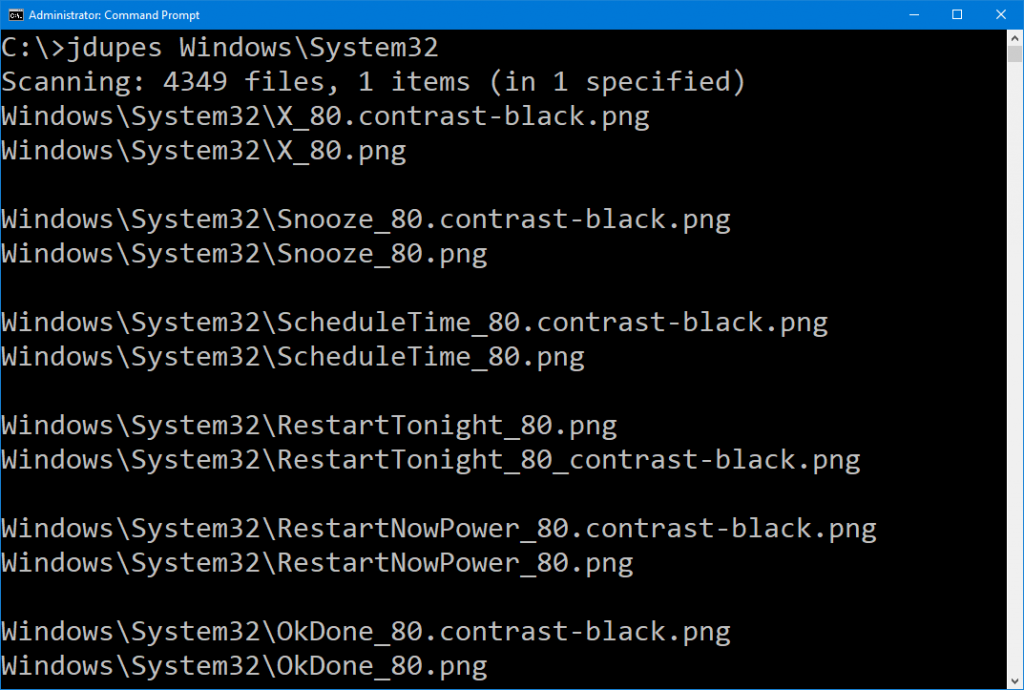While perusing my link referrals on GitHub, I noticed this thread where my duplicate scanner jdupes was mentioned. I then noticed the comment below it:
There is also a much faster modern alternative to fdupes and jdupes: fclones. It searches for files in parallel and uses a much faster hash function than md5.
My response comment pretty much says it all, so I’m making that the entire remainder of this post.
I noticed that fclones does not do the byte-for-byte safety check that jdupes (and fdupes) does. It also relies exclusively on a non-cryptographic hash for comparisons. It is unsafe to rely on a non-cryptographic hash as a substitute for the file data, and comparisons between duplicate finders running in full-file comparison mode vs. running in hash-and-compare mode are not appropriate. The benchmark on the fclones page ran jdupes 1.14 without the -Q option that disables the final byte-for-byte confirmation, so there is a lot of extra work for the purpose of avoiding potential data loss being done by jdupes and being skipped entirely by fclones.
jdupes already uses a faster hash function than MD5 (xxHash64 as of this writing, previously jodyhash), and it is fairly trivial to switch to even faster hash functions if desired…but the fact is that once you switch to any “fast hash” function instead of a cryptographic one the hash function used is rarely a bottleneck, especially compared to the I/O bottleneck represented by most consumer-grade hard drives and low-end SSDs. If everything to be checked is in the buffer cache already then it might be a bottleneck, but the vast majority of duplicate scan use cases will be performed on data that is not cached.
Searching for files in parallel is only an advantage if the disk I/O is not a bottleneck, and you’ll notice that the fclones author performed the dedupe benchmarks on a (presumably very fast since it’s paired to a relatively recent Xeon) 512GB NVMe SSD with an extremely fast multi-core multi-threaded processor. There is a very small access time penalty for random read I/O on a fast NVMe SSD, but there is an extremely large access time penalty for random read I/O on a traditional rotating hard drive or RAID array composed of several hard drives. Any number of multiple threads firing off reads on the same RAID array at the same time will slow even most RAID arrays to a single-digit MB/sec death crawl. I understand that many people will be working with SSDs and some duplicate scanner programs will be a better choice for SSDs, but the majority of computer systems have spinning rust instead of flash-based disks.
It is strongly advisable to (A) run your own benchmarks on your specific workload and hardware, and (B) understand how to use the program within your own personal acceptable level of risk. Both of these are different for every different person’s needs.
UPDATE: I found another instance of the fclones author claiming jdupes being single-threaded makes it slow; to quote directly:
Unfortunately these older programs are single-threaded, and on modern hardware (particularly on SSDs) they are order of magnitude slower than they could be. If you have many files, a better option is to use fclones (disclaimer: I’m the author), which uses multiple threads to process many files in parallel and offers additional filtering options to restrict the search.
The points I’ve made above still stand. Unless you’re running the author’s enterprise-grade high-end hardware, your disk random access latency is your major limiting factor. I’d love to see what fclones does on something like a 24TB disk array. I’d wager–exactly as stated above–that 8 or 32 simultaneous I/O threads brings the whole process to a death crawl. Perhaps I should bite the bullet and run the tests myself.
UPDATE 2: I was right. Benchmark article and analysis forthcoming.
Featured image Licensed under CC-BY from Steve Jurvetson, https://www.flickr.com/photos/jurvetson/3327872958


